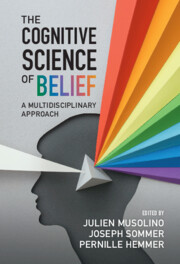Book contents
- The Cognitive Science of Belief
- The Cognitive Science of Belief
- Copyright page
- Contents
- Figures and Tables
- Contributors
- Chapter 1 Introduction
- Part I Understanding Belief
- Part II Domains of Beliefs
- Religion and Morality
- Economics and Politics
- Science and Race
- Chapter 16 How Intuitive Beliefs Inoculate Us against Scientific Ones
- Chapter 17 COVID-19: Conspiracies and Collateral Damage vs Constructive Critique
- Chapter 18 Believing in Race vs Knowing Ourselves
- Part III Variation in Beliefs
- Index
- References
Chapter 17 - COVID-19: Conspiracies and Collateral Damage vs Constructive Critique
from Science and Race
Published online by Cambridge University Press: 03 November 2022
- The Cognitive Science of Belief
- The Cognitive Science of Belief
- Copyright page
- Contents
- Figures and Tables
- Contributors
- Chapter 1 Introduction
- Part I Understanding Belief
- Part II Domains of Beliefs
- Religion and Morality
- Economics and Politics
- Science and Race
- Chapter 16 How Intuitive Beliefs Inoculate Us against Scientific Ones
- Chapter 17 COVID-19: Conspiracies and Collateral Damage vs Constructive Critique
- Chapter 18 Believing in Race vs Knowing Ourselves
- Part III Variation in Beliefs
- Index
- References
Summary
The COVID-19 pandemic that turned the world upside down in early 2020 also gave rise to an “infodemic” of misinformation and conspiracy theories. This chapter tackles three issues. We first explore the political and ideological underpinnings of the COVID-19 infodemic and its organizational, rhetorical, and ideological links to climate denial. We then highlight the legitimacy of political grievances in light of government pandemic policies. We conclude by proposing a sketch of the boundary between politically-motivated denial of science on the one hand and legitimate political arguments on the other.
Keywords
- Type
- Chapter
- Information
- The Cognitive Science of BeliefA Multidisciplinary Approach, pp. 374 - 397Publisher: Cambridge University PressPrint publication year: 2022

